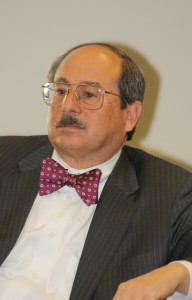By Dave Workman | Senior Editor
The Second Amendment Foundation has filed a notice with the U.S. Ninth Circuit Court of Appeals in San Francisco, seeking review of a lower court dismissal of its lawsuit challenging Initiative 594, the gun control measure approved by voters in November.
I-594 garnered about 60 percent of the vote, after a brutal and expensive campaign that spent more than $10.2 million to pass it. The measure was largely financed by wealthy Seattle-area elitists including Bill Gates, Paul Allen, Steve Ballmer and Nick Hanauer, with major support from anti-gun billionaire Michael Bloomberg and his Everytown for Gun Safety.
The District Court judge in Tacoma dismissed the case on “standing,” without a formal hearing on the actual merits of the lawsuit. An appeal to the Ninth Circuit is aimed at getting a reversal, remand and hearing on those merits, noted SAF founder and Executive Vice President Alan M. Gottlieb.
He is also one of the individual plaintiffs in the case.
And there’s another new twist. SAF and its co-plaintiffs have added a veteran California attorney to their legal team. Attorney Donald Kilmer of San Jose has considerable experience with the Ninth Circuit, and he joins the organization’s legal team, which includes Seattle attorneys Steven W. Fogg and David B. Edwards with Corr Cronin Michelson Baumgardner Fogg & Moore LLP, and Bellevue attorney Miko Tempski, for this next round of activity.
Federal District Judge Benjamin H. Settle dismissed the case in May essentially because none of the plaintiffs could show damage since they had not been prosecuted for violating the law. Indeed, the Washington State Patrol declined to enforce the “transfer” provisions during an anti-I-594 demonstration in December because it was allegedly not clear whether exchanging firearms falls under the definition of “transfer.”
However, the term seems clearly defined in the text of the measure. “‘Transfer’ means the intended delivery of a firearm to another person without consideration of payment or promise of payment including, but not limited to, gifts and loans.” (Emphasis added.)
“We believe an appeal will result in the case being remanded for full hearing because there are serious issues at stake,” Gottlieb said in a press release. “Citizens should not have to actually be criminally prosecuted in order to challenge the constitutionality of a poorly-written law.”
In addition to Gottlieb, plaintiffs include with his son, Andrew, an Arizona resident, Joe Waldron of Florida and Californian Gene Hoffman, plus Darryl Lee and Xee Del Real, both Washington residents. They are joined by the Northwest School of Safety, Puget Sound Security, Inc., the Pacific Northwest Association of Investigators, Inc., Firearms Academy of Seattle, Inc., and the Gottlieb Family Revocable Living Trust.
The lawsuit was filed Dec. 30, and several weeks ago, Judge Settle allowed two gun control groups – the Washington Alliance for Gun Responsibility and the Everytown for Gun Safety Action Fund for I-594 – to intervene as co-defendants. WAGR ran the initiative campaign and Everytown was a heavy backer. Everytown is the $50 million lobbying group created by billionaire anti-gunner Michael Bloomberg.
As acknowledged in the original lawsuit, “Plaintiffs are not aware of any arrests, citations, or prosecutions related to a violation of I-594 in the month it has been in effect. But Plaintiffs and members of the SAF have refrained and continue to refrain from engaging in constitutionally protected activities for fear of arrest and prosecution under I-594.”
If the Ninth Circuit reverses and remands for a hearing in Tacoma, the state may have some explaining to do. So far, the state has declined to enforce provisions of the law.
“The agencies of the State of Washington,” the complaint asserts, “have so far either disclaimed the responsibility to interpret I-594 or provided interpretations that are so far removed from the language as to be useless.”
The lawsuit also addresses the inability of non-residents visiting Washington to borrow a sidearm for personal protection while here. Under I-594, such loans are subject to background checks, but a federal firearms licensee cannot do a background check for the transfer of a handgun to a non-resident of the state.




